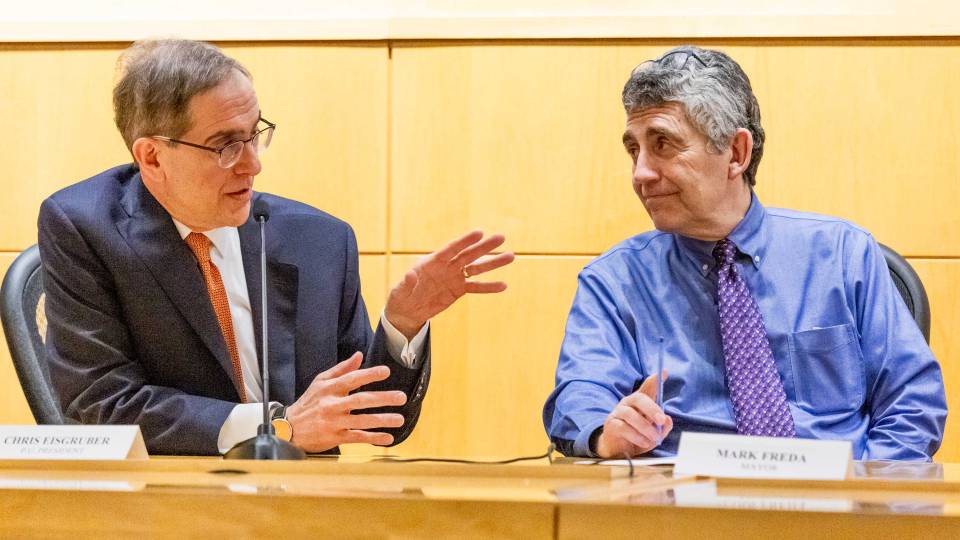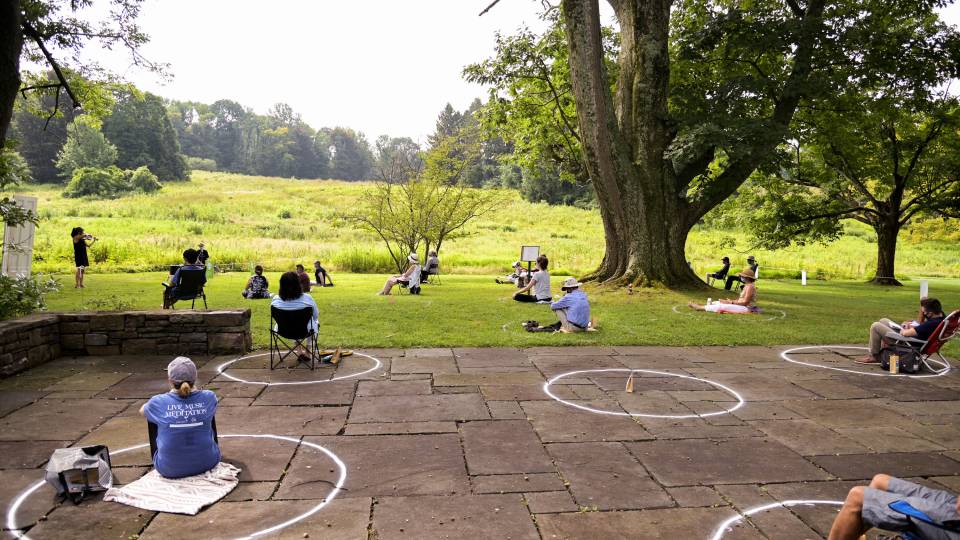Princeton University President Christopher L. Eisgruber (second from left) answers a question from Princeton Mayor Liz Lempert (second from right) as Princeton Council President Jenny Crumiller (far right) and Councilor Dwaine Williamson (far left) listen. Eisgruber met with the Princeton Mayor and Council on Feb. 11 for an annual meeting to discuss shared interests and partnerships between the University and town. This year’s discussion focused on the region’s innovation ecosystem, plans for Lake Campus, sustainability and other topics.
Princeton University President Christopher L. Eisgruber joined Princeton municipal officials Monday, Feb. 11, to discuss a range of mutual interests, including the region’s growing innovation ecosystem, the University’s Campus Plan, sustainable initiatives, transportation management and supporting community partnerships.
The annual town-gown meeting was held at the Monument Hall municipal building, bringing together Eisgruber with Princeton Mayor Liz Lempert and Princeton Council members.
In advance of the meeting, the University prepared a summary of various contributions to and partnerships with the town in 2018, including: the $3.22 million voluntary contribution to the municipality; $9.1 million in taxes (making the University the largest property taxpayer in Princeton); $50,000 toward a Habitat for Humanity affordable housing project on Lytle Street; and $500,000 toward the construction of new headquarters for the Princeton First Aid and Rescue Squad.
“We are really lucky to have [the University] as neighbors and really appreciate your time tonight,” Lempert said.
Eisgruber agreed. “It’s wonderful to be able to talk about the opportunities that we have to work together around what I think are very substantial joint interests,” he said. “For me, one of the prime benefits of these conversations that we’ve been having on a regular basis is that we do have open channels of communication. When either creative ideas for difficult challenges or new opportunities arise, there is a foundation laid that we can work from.”
New opportunities include University efforts to strengthen innovation in the region. Eisgruber cited as examples the new Google AI Lab that opened on Nassau Street; the Princeton Innovation Center BioLabs in Plainsboro, a wet-lab space for science startups in the state; a collaboration between Microsoft and the University to tackle fundamental challenges in microbiology; and a cooperative agreement between Celgene and the University’s Princeton Catalysis Initiative.
“The kind of research and teaching that takes place through these collaborations advances our mission of pushing the frontiers of knowledge in a way that makes a difference in the world,” Eisgruber said.
Lempert said the Google offices were “a win for the town,” and asked how the municipal government could foster more technology ventures.
Eisgruber said Princeton is already an attractive community for innovative organizations seeking proximity to University students and faculty collaborators.
“[The University’s strategy] is about facilitating various kinds of startups or joint ventures, and trying to make sure that we have the nimbleness to accommodate different potential research collaborators as they come in,” he said. “Our strategy, and I would urge the town in the same direction, is really around nimbleness and flexibility. To try to make sure, in our case, that we are serving the mission of our students and our faculty.”
Plans to develop Lake Campus across Lake Carnegie in West Windsor also will be a positive for the area, Eisgruber said. Lake Campus is envisioned as a mixed-use community that could include academic partnerships and innovation initiatives; administrative offices; athletic and recreational facilities; graduate student housing; and a parking area and transit hub.
Eisgruber said the larger space available at Lake Campus will facilitate collaborations that might not fit in Palmer Square or on Nassau Street. But, he added, the development should be a boon to the University and Princeton community.
“If you get more activity going on at Lake Campus, I guarantee you there will be increased appetite for other kinds of collaborations on Nassau Street. All of a sudden what you will have there is yet another attractor to the region,” he said.
Council member Eve Niedergang, a 1989 graduate alumna of Princeton, was glad to hear the University will provide more housing for graduate students at Lake Campus. She also thanked Eisgruber for his leadership on issues related to immigration and the federal Deferred Action for Childhood Arrivals (DACA) policy.
“I think having your leadership and the resources of the University really means a lot, so from my heart, thank you for that,” Niedergang said.
Council President Jenny Crumiller asked how the University and town can reduce traffic and limit carbon emissions from single-occupancy vehicles. Council member David Cohen, who was unable to attend the meeting, also submitted questions related to sustainability.
“I want to thank you for opening Tiger Transit up to the community,” Crumiller said to Eisgruber. “The Public Transit Committee has been working on how we can promote that partnership more and have our one little bus [the freeB community shuttle bus] work better with your buses.”
Eisgruber agreed the issue is challenging without a robust mass transit system, but said the community can look at creative solutions like bike paths and ride sharing. He mentioned the University’s Revise Your Ride campaign that incentivizes employees to walk, bike, carpool, ride the bus or take the train to work.
Calling Princeton University an “anchor institution,” Council member Leticia Fraga applauded the University for its community building. Examples mentioned during the meeting included the Tiger Challenge program that pairs student teams with municipal leaders to tackle issues like affordable housing and sustainable waste collection; the Princeton University Art Museum’s events for Spanish-speaking residents; the Office of Religious Life’s community pumpkin carving; and student volunteers who mentor local children.
“In each instance, the residents ventured beyond the gates and experienced campus as an inclusive space, and as a site of discovery and connection,” said Fraga. She added she would like the University to find more ways to support local businesses and vendors.
Extending the conversation beyond Princeton, Council member Dwaine Williamson asked about the University’s community connections across Mercer County.
As one example, Eisgruber mentioned the Princeton University Preparatory Program for high-achieving, low-income high school students in Ewing, Hamilton, Lawrence Township, Princeton and Trenton, New Jersey. He also highlighted the Princeton ArcPrep Program, a collaboration between the School of Architecture and Trenton Central High School to introduce high schoolers to architecture and help diversify the field.
Speaking earlier in the night, Councilor Timothy Quinn said the annual meeting exemplified how a strong town-gown relationship benefits both sides of Nassau Street, the main road along the entrance to campus.
“I think we are both stronger with a flow of people across that street and with enterprises that tie us together,” Eisgruber agreed.






